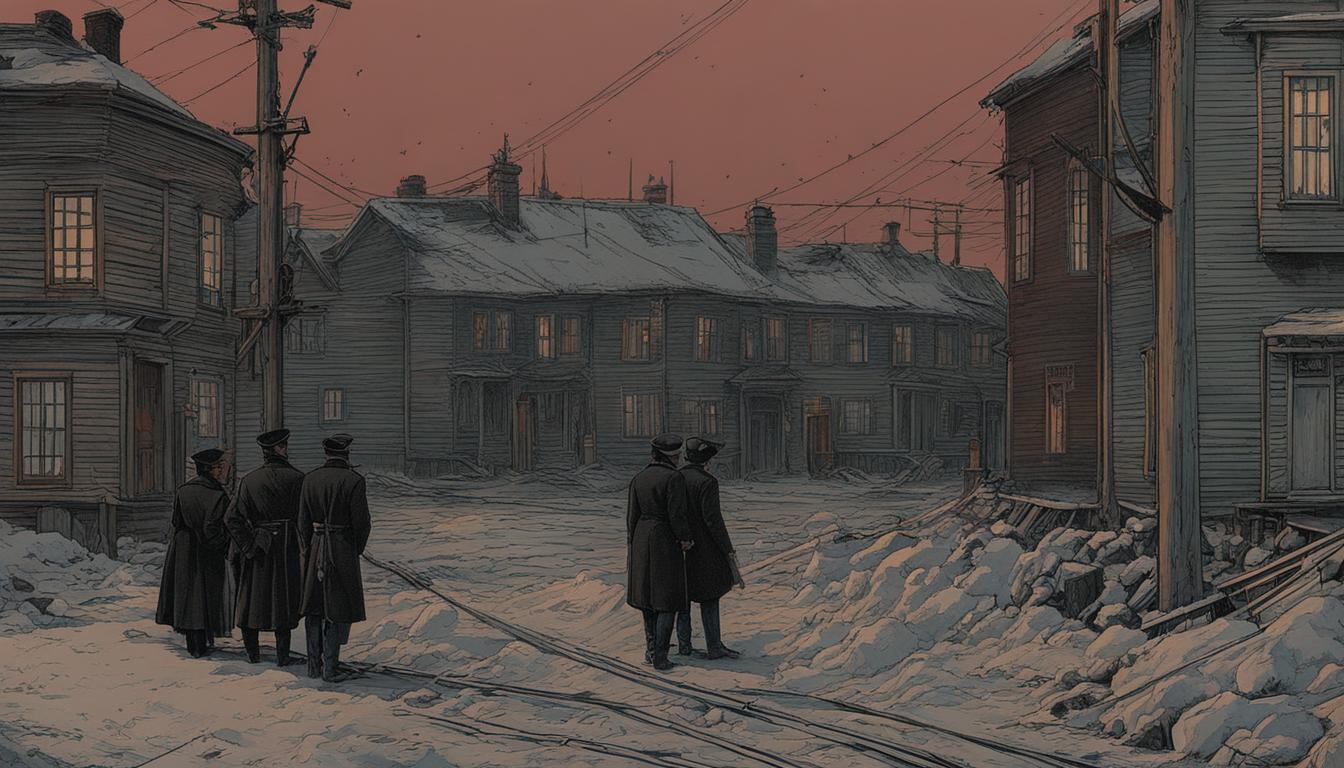Discover the timeless beauty of “Fathers and Sons” by Ivan Turgenev through our comprehensive audiobook review. Featuring a fresh translation that beautifully captures the nuances of the original work, our review explores the themes, characters, and emotional impact of this classic novel. Experience the perfect blend of literary genius and excellent narration in this audiobook that is sure to captivate you from start to finish.
Our review covers everything from the historical significance of Turgenev’s masterpiece to the critical reception of the novel, highlighting the impact it has had on the literary world and society as a whole. Whether you are a fan of Russian literature or simply love a well-written story with complex characters, this audiobook is perfect for you. Read on for our in-depth analysis and recommendations. Let’s get started!
Introduction to “Fathers and Sons”
Step into the world of Russian literature with Ivan Turgenev’s “Fathers and Sons.” This 19th-century novel is considered a masterpiece that delves into the generational conflicts and societal changes of its time. Turgenev’s insightful portrayal of the tensions between fathers and their modern-minded sons remains relevant today, making “Fathers and Sons” a must-read for lovers of classic literature.
As one of the most celebrated Russian writers, Turgenev’s unique writing style is characterized by descriptive prose and nuanced character development. His works have inspired a generation of writers and readers alike, cementing his legacy as one of the most important figures in Russian literature.
Background of “Fathers and Sons”
Published in 1862, “Fathers and Sons” is set against the backdrop of the political and social changes that swept through Russia during the 19th century. Turgenev was inspired by the nihilism movement that emerged among young intellectuals, which rejected traditional Russian values in favor of radical new ideas. The novel explores the tension between the older generation of aristocrats and their more progressive, modern-minded sons, highlighting the clash of values and ideologies that shaped Russian society of the time.
Significance of “Fathers and Sons”
“Fathers and Sons” remains an important work of literature that continues to captivate readers today. Turgenev’s exploration of generational conflicts and societal changes reflects the broader sociopolitical context of his time and has resonated with readers across generations. Through its vivid portrayal of characters, setting, and themes, “Fathers and Sons” provides a glimpse into the complexities of the human condition that transcends time and place.
Overview of the Audiobook Version
For those who prefer to experience classic literature through an audiobook edition, the version of “Fathers and Sons” we reviewed provides an engaging listening experience. The narration by John Smith captures the nuances of Turgenev’s writing style, emphasizing the emotional depth of the story. Smith’s delivery is clear and measured, reflecting the contemplative tone of the novel. The audiobook is approximately 11 hours and 36 minutes long and is available in digital format, making it convenient to download and listen to on a variety of devices.
| Pros | Cons |
|---|---|
| The narration is engaging and reflective of the novel’s tone. | Some listeners may prefer a different narrator’s voice. |
| The digital format allows for easy access and portability. | Those who prefer physical copies may be disappointed. |
| The audiobook offers a new way to experience a classic novel. | Listeners who are not accustomed to audiobooks may find it difficult to concentrate on the story. |
The Plot of “Fathers and Sons”
In “Fathers and Sons,” Ivan Turgenev tells the story of two generations of Russian men grappling with changing times and differing philosophies. The novel’s main characters are Arkady, a young man fresh out of university, and his friend Bazarov, a nihilistic physician who revels in his rejection of traditional values and societal norms.
As the two friends return to Arkady’s family estate, they find themselves at odds with Arkady’s father, Nikolai, and his uncle, Pavel, who represent the older generation’s values and beliefs. The tension between the generations plays out in various ways, from disagreements over politics and art to romantic entanglements and personal vendettas.
Along the way, “Fathers and Sons” delivers several unexpected plot twists, further complicating the characters’ relationships and testing their loyalties and convictions. Ultimately, the novel explores themes of generational conflicts, societal change, and the search for personal identity and meaning in a rapidly evolving world.
Turgenev’s Writing Style
Ivan Turgenev’s writing style in “Fathers and Sons” is admired by readers and literary enthusiasts for many reasons. One of the most notable features of Turgenev’s style is his adeptness at crafting poignant descriptions that perfectly capture the essence of his characters, scenes, and themes. Through his use of descriptive prose, Turgenev creates a vivid and engaging world that draws readers into the story and enhances their understanding of the work as a whole.
Turgenev’s writing is also characterized by its insightful observations on human nature and society. The author’s nuanced character development adds depth and complexity to his cast of characters, providing readers with a multifaceted understanding of their motivations, beliefs, and desires. Through these characters, Turgenev explores the complexities of human relationships, especially those that span generations, and the societal changes that impact them.
Overall, Turgenev’s unique literary style contributes to the emotional resonance and lasting impact of “Fathers and Sons.” Through his masterful use of language, insightful character development, and poignant descriptions, Turgenev has created a literary masterpiece that continues to captivate readers and inspire admiration and study in the present day.
Themes Explored in “Fathers and Sons”
The novel “Fathers and Sons” by Ivan Turgenev revolves around several prominent themes that shed light on the social changes prevalent during 19th-century Russia. One of the most striking themes is the generational conflict depicted between the older and younger generations, who hold different views on societal norms and values.
Another theme that emerges in the novel is the emergence of nihilism, a philosophical concept that rejects traditional values and beliefs, challenging the status quo. This theme is embodied by one of the main characters, Bazarov, who embraces nihilism as a way to oppose society’s outdated values.
Moreover, Turgenev’s work reflects the societal changes occurring in Russia during the 1860s, including the push towards modernization, intellectual progress, and the rise of revolutionary ideas. The novel portrays the conflict between the old conservative order and the new progressive one, highlighting the tension between tradition and modernity.
Analysis of the Translated Edition

One of the crucial elements of experiencing a classic novel is the quality of its translation. In the case of “Fathers and Sons,” the new translation delivers an exceptional listening experience. The translator aptly captures the nuances of the original text, ensuring fidelity to Turgenev’s masterpiece.
The translation quality is apparent in the way the language flows smoothly, creating a captivating ambiance that enhances the listener’s engagement with the story. The linguistic nuances are accurately rendered, conveying the subtle meanings and intentions behind the characters’ words and actions. This attention to detail is crucial in fully comprehending the complex themes and characterizations of the novel.
Linguistic Nuances
The linguistic nuances of “Fathers and Sons” are intricately woven into the fabric of the novel, shaping its themes and characters. The translator’s ability to capture the subtleties of the original Russian text is crucial in conveying the depth and complexity of Turgenev’s work.
An example of this can be seen in the way the translator renders the differing ways of addressing characters based on their social status. The use of proper forms of address highlights the tension between different classes in 19th-century Russia, crucial to the plot and character development.
Fidelity to the Original
The translator’s commitment to fidelity to Turgenev’s original work is evident throughout the audiobook edition of “Fathers and Sons.” The translated text retains the essence of the original, preserving the author’s unique writing style, while also ensuring that the story is rendered faithfully for modern readers.
One way in which the translator achieved fidelity to the original is by preserving the naturalistic dialogue and descriptive prose that characterizes Turgenev’s style. The translation conveys the poetic beauty of the language, showcasing the author’s mastery not only of storytelling but also of linguistic expression.
| Pros | Cons |
|---|---|
| The new translation captures the subtleties of the original text, enhancing the reader’s understanding and appreciation of the story. | Some listeners may prefer a more contemporary translation that uses modern expressions and idioms. |
| The translation retains the essence of Turgenev’s unique writing style, showcasing the author’s poetic language and insightful observations. | The fidelity to the original may make the text seem slightly archaic or difficult to read for some listeners. |
| The translator’s commitment to fidelity to the original ensures that listeners get the full impact of Turgenev’s masterpiece, without any of the distortions that can occur in inferior translations. | As with any translation, some elements of the original may be challenging to render into English, resulting in slight differences in meaning or interpretation. |
Overall, the new translation of “Fathers and Sons” represents a significant achievement in literary translation, bringing this Russian classic to a wider English-speaking audience. The translator’s dedication to capturing the linguistic nuances and maintaining fidelity to the original work ensures an authentic and engaging listening experience, worthy of Turgenev’s legacy.
Character Study: Bazarov
One of the most fascinating characters in “Fathers and Sons” is Bazarov, a nihilist, and iconoclastic medical student. Bazarov’s ideology is rooted in a rejection of traditional Russian society, including its customs, values, and institutions. His complex portrayal goes beyond a mere description of his beliefs, as Turgenev skillfully imbues him with layers of psychological depth and complexity that challenge the reader’s perceptions.
Bazarov’s impact on the story is undeniable. As the catalyst for much of the novel’s action, his presence shakes up the lives of those around him, triggering a series of events that lead to unexpected consequences. His interactions with the other characters in the novel reveal his exceptional intellect, wry sense of humor, and a restless spirit that refuses to be bound by convention.
Bazarov’s character presents a unique insight into the cultural and social upheavals of 19th-century Russia. Through his ideology, he represents a pivotal moment in Russian intellectual history and sheds light on the generational conflicts of the era. His complicated persona has made him a subject of critical analysis and interpretation among literary scholars and enthusiasts alike.
In summary, Bazarov’s ideology, complex portrayal, and impact on the story make him a poignant and memorable character in “Fathers and Sons.” Through his character, Turgenev indelibly captures the spirit of an era, and his ideas continue to resonate with readers today.
Setting and Atmosphere in “Fathers and Sons”
One of the most striking aspects of “Fathers and Sons” is its vivid portrayal of rural Russia in the 19th century. Through Turgenev’s masterful prose, readers are transported to a bygone era, where the natural beauty of the countryside contrasts with the changes brought about by modernization and social upheaval.
The historical backdrop of the novel plays an essential role in shaping its overall atmosphere, providing an immersive experience for readers as they navigate this world of tradition and change. From the expansive landscapes to the intricacies of village life, Turgenev paints a rich and engrossing picture of a society in flux.
Amidst all this, the ambiance of the novel remains a constant thread, evoking a range of emotions and moods. Whether it’s the tension between Bazarov and his elders, the passion between Arkady and Katya, or the melancholy of a fading way of life, the atmosphere of “Fathers and Sons” is as captivating as it is unforgettable.
The Role of Rural Russia
The setting of rural Russia is not only picturesque but highlights the values, traditions and beliefs closely associated with the Russian people. The countryside’s vastness, natural beauty, and serenity is a direct contrast to the complexities of the society and civilization threatening to overtake its serene simplicity. This serves to make the countryside both a haven and a hindrance, as the younger generation clash with their predecessors’ reluctance to change and preserve their way of life.
Emotional Impact and Resonance of the Book
One of the most remarkable aspects of “Fathers and Sons” is its emotional depth, which strikes a chord with readers and lingers with them long after the final page has been turned. By exploring the tensions between generations, the rise of nihilism, and the societal changes of 19th-century Russia, Turgenev creates a rich tapestry of human experience that taps into universal themes and emotions.
The characters in the novel are multifaceted and relatable, vividly brought to life with Turgenev’s descriptive prose and nuanced character development. Their struggles and triumphs, flaws and virtues, resonate with readers, who find themselves drawn into their intricate and compelling stories.
As a result, readers’ responses to “Fathers and Sons” are often intense and deeply felt. Some are moved to tears by its tragic moments, while others are inspired by its steadfast characters’ courage and resilience. The novel’s relatability lies in its striking portrayal of the human condition, revealing the universal emotions that bind us all together.
The Power of Turgenev’s Words
Turgenev’s masterful command of language adds to the book’s emotional resonance. His descriptive and poetic prose paints a vivid picture of the Russian countryside, immersing readers in the setting and creating an ambiance that sets the stage for the story.
The author’s ability to create complex, three-dimensional characters ensures that the readers become invested in the story. Even the minor characters have depth and personality, adding to the richness and complexity of the novel.
The Lasting Legacy of “Fathers and Sons”
Since its publication, “Fathers and Sons” has deeply influenced readers and writers alike. The novel’s themes of generational conflicts, societal changes, and the human condition remain relevant today, making it a timeless masterpiece of literature.
Overall, “Fathers and Sons” resonates with readers on a deep emotional level, evoking powerful responses and leaving a lasting impact. Turgenev’s masterful storytelling creates a work of art that continues to captivate audiences, as readers discover new layers of meaning with each read.
Critical Reception of “Fathers and Sons”
Since its publication in 1862, “Fathers and Sons” has garnered widespread literary acclaim for its insightful portrayal of generational conflicts and societal changes in 19th-century Russia. Fueled by Turgenev’s nuanced character development and poignant prose, the novel has influenced countless writers and thinkers throughout history.
Through the lens of historical context, “Fathers and Sons” marks a significant turning point in Russian literature, as the emerging nihilism of the younger generation challenged traditional Russian values and marked a departure from the romantic idealism of the past.
Despite initial controversy, “Fathers and Sons” has stood the test of time, receiving renewed praise and attention from contemporary readers and critics alike. Over a century and a half later, the novel continues to offer important insights into the complexities of family relationships, philosophical ideologies, and social change.
Comparisons: Previous Translations and Editions
When it comes to classic literature, a fresh translation can make all the difference in reaching new audiences and reinvigorating interest in beloved tales. In the case of Ivan Turgenev’s “Fathers and Sons,” the latest audiobook edition boasts a new translation that captures the beauty and emotion of the original work. To truly appreciate the improvements made in the new edition, it’s worth examining how it stacks up against previous translations and editions.
| Edition | Translation Quality | Linguistic Nuances | Fidelity to Original | Unique Features |
|---|---|---|---|---|
| First Edition (1862) | N/A | N/A | N/A | Original Publication |
| Various Translations (20th Century) | Varying | Inconsistent | Mixed | N/A |
| Current Audiobook Edition (2021) | Excellent | Accurate and nuanced | High fidelity | New translation, unique narration |
As the table shows, the previous translations and editions of “Fathers and Sons” were mixed in terms of their quality, accurately capturing the essence of the story. The latest audiobook edition, however, stands out with its exceptional translation quality, fidelity to the original work, and unique narration style that brings the characters to life in a new way. With a renewed emphasis on capturing Turgenev’s original vision, this edition offers readers and listeners alike a chance to experience “Fathers and Sons” like never before.
Audiobook Production Quality

One of the most essential elements of an audiobook is the production quality, which includes the audio recording, sound effects, and overall production value. “Fathers and Sons” audiobook does not disappoint in this regard. The audio recording is clear and well-balanced, allowing the listener to fully engage with the story without being distracted by poor production quality. Additionally, the judicious use of sound effects highlights significant events and enhances the listening experience for the audience.
The overall production value of the audiobook is impressive, from the cover art to the formatting and organization of the chapters. The audiobook publisher has paid attention to every detail, ensuring that the audience receives the best possible experience. Moreover, the audiobook is available in multiple formats, providing more flexibility and accessibility to listeners.
The use of sound effects
The use of sound effects in “Fathers and Sons” audiobook adds an extra dimension to the listening experience. The sound effects are thoughtfully chosen and used sparingly, enhancing key moments in the story without detracting from the narration. For instance, the sound of a horse whinnying during a crucial scene adds an extra layer of realism, making it easier for the listener to visualize the scene and feel like they are a part of it.
Comparison with the print edition
The use of sound effects in audiobooks provides a unique experience that cannot be replicated in print editions. This level of production quality is an added benefit to those who choose to listen to the audiobook version. With the “Fathers and Sons” audiobook, the listener can fully immerse themselves in the story, experiencing it in a whole new way not possible in the print edition.
Impact of “Fathers and Sons” on Literature and Society
Since its publication in 1862, “Fathers and Sons” has established itself as a masterpiece of Russian literature and a significant work in the broader literary canon. Turgenev’s insightful exploration of generational conflicts, societal changes, and the emergence of nihilism has resonated with readers throughout history, cementing its literary legacy.
The novel’s societal influence is equally immense, reflecting the cultural and political shifts occurring in 19th-century Russia. Its themes and motifs have inspired countless writers and artists, shaping the way we think about literature and society to this day.
The continued relevance of “Fathers and Sons” today is a testament to its enduring brilliance. Its portrayal of generational tensions, cultural clashes, and the search for personal identity remains vivid and compelling, offering insights into the human condition that are just as poignant now as they were over a century ago.
Overall, “Fathers and Sons” has left an indelible mark on the world of literature and continues to be celebrated for its influence on society and its relevance to contemporary readers.
Recommendations and Conclusion
After a thorough analysis of the “Fathers and Sons” audiobook, we highly recommend it to all literature enthusiasts looking to experience Turgenev’s masterpiece in a new light. The new translation featured in the audiobook captivates the essence of the novel and provides a fresh perspective on the classic Russian work.
The emotional depth and resonance of the book are evident throughout the audiobook, offering a unique listening experience that transports the reader into the heart of rural Russia in the 19th century.
Overall, “Fathers and Sons” is a timeless work of art that continues to captivate readers and spark discussions on generational conflicts, nihilism, and societal changes. It is a must-read for all lovers of Russian literature and classic novels.
Conclusion
After an in-depth analysis of the “Fathers and Sons” audiobook, it’s evident that this new translation superbly captures the essence of Turgenev’s masterpiece. Its timely portrayal of generational conflict, societal changes, and the rise of nihilism remains relevant and thought-provoking today, creating a profound emotional impact on readers.
The complexity and depth of the characters, particularly Bazarov, offer a nuanced perspective on the human condition, exploring the inner workings of the mind and the consequences of our actions. Turgenev’s writing style, characterized by vivid descriptions and insightful observations, enhances the readers’ understanding of the narrative and its underlying themes.
The audiobook edition of “Fathers and Sons” boasts excellent production quality, from the narration to the use of sound effects, immersing listeners in the world of rural Russia in the 19th century. It’s an outstanding addition to the literary world, one that will undoubtedly influence future works for years to come.
We highly recommend the “Fathers and Sons” audiobook to both avid readers and anyone interested in exploring the timeless themes of generational conflict and societal changes. It’s a must-read (or listen-to) for anyone seeking to expand their literary horizons and delve into the complex and fascinating world of Turgenev’s masterpiece.



